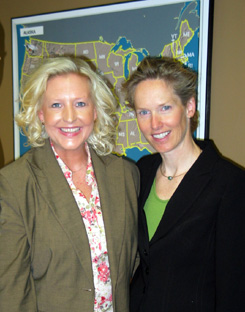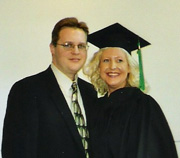 |
Maria Manske, left, and Karen Nichols. |
The Fremont, Neb., native attended Metropolitan Community College to take pre-requisite classes before attending the Alegent Health School of Radiologic Technology from 1996-98. She was first in her class — both years — and received her certificate in radiography. Then Manske moved to North Carolina and attended the radiation therapy school at the University of North Carolina-Chapel Hill from 1999-2000. She completed that program, too, with top academic honors and received her certificate in radiation therapy.
She flew to Houston the evening of her graduation and the next day began the medical dosimetry program at the University of Texas M.D. Anderson Cancer Center. She received her certificate in medical dosimetry a year later – again as the class academic leader. Manske worked at the U. T. M.D. Anderson Cancer Center for two years and then passed her medical dosimetry boards on the first eligibility in June 2002.
For the past two years, she has worked as a locum tenens certified medical dosimetrist throughout the country. Dosimetry is calculating the dose of radiation for cancer patient treatment plans. This specialty is highly sought after and shortages across the nation enable Manske to enjoy her love of travel by serving short contractual stints in clinics and hospitals in South Carolina, Pennsylvania, Iowa and Kansas City, Kan.,
where she was living when she graduated from in May from UNMC.
“I’m having a wonderful career,” Manske said. “My radiation therapy program director at UNC-Chapel Hill, Dr. Robert Adams, was my mentor for medical dosimetry. Within the first couple weeks of school I really felt a calling to do dosimetry. Dr. Adams helped me envision this specialty as my own and inspired me to pursue my dream in Houston. I was very lucky to have trained under him.
“The simple fact is the UNMC program allowed me access and opportunity to continue my studies any where, any place and any time. I never missed a beat. I even was able to use Sylvan Learning Centers to proctor my exams throughout my coursework.”
Distance education technology allows enrolled students to be able to work as members of a healthcare workforce team in their communities, completing their professional degree requirements, said Karen Nichols, assistant professor in the School of Allied Health Professions and the SAHP Distance Education Coordinator. These online initiatives are being supported, in part, by an Allied Health Project Grant through the Health Resources and Services Administration, Bureau of Health Professions. Nichols is principal investigator of the grant, titled, “Career Advancement through Distance Education Technology – The CADET Project.”
 |
Maria Manske with her fiance, Charles Poole, at this spring’s commencement. |
Manske said she has some great memories of her education at UNMC. She shared a treatment technique with an aspiring dosimetrist in Washington State and he later asked her permission to share this pediatric technique with his faculty. She said she initially missed going to traditional classes and didn’t think she would do as well because she wouldn’t have the interaction with her classmates.
“But I was wrong. Blackboard served just fine as a virtual classroom,” Manske said. “We were all able to communicate effectively. As for Karen Nichols, I can’t say enough. Her involvement in my education was extraordinary.”
“I was a ‘jack of all certificates,’ but lacked a formal bachelor’s degree,” Manske said. “Karen worked very hard to get a lot of my previous credits successfully transferred, so I actually only needed four semesters to complete my degree. I thank her from the bottom of my heart for her consistent personal attention to my every need.”
In addition, Manske thanked Charles Poole, her fiance, for his support throughout her educational journey. Also, she praises Dr. Michael Madden, cross-sectional anatomy and physiology instructor at Fort Hays State University, Fort Hays, Kan.
“I highly recommend UNMC’s distance learning program to any veteran in radiation sciences who would like to complete their degree,” Manske said. “I feel lucky to have stumbled upon this program during an online literature search for my fiance back in 2002. The program is awesome and everybody involved works hard to make sure you succeed and get your degree.
“I am going to keep doing the locum tenens work because I really enjoy working with new radiation therapy departments. I often find myself in a teaching capacity and I like that. I would like to be a formal teacher some day because I don’t think there is any greater satisfaction that inspiring other people to pursue their dreams. To that end, I hope to find another distance learning program as good as UNMC’s that will help me obtain my master’s degree.”